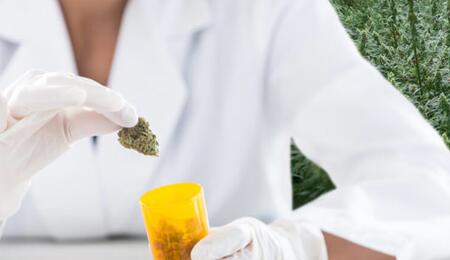Which Pharmaceuticals Could Cannabis Replace?

Cannabis-based medications have already begun to replace a wide variety of conventional drugs in the management of common conditions, including chronic pain, epilepsy and insomnia.
A 2015 Canadian cross-sectional survey found that 80.3% of 410 respondents substituted cannabis for at least one prescription drug. As well as this, there is evidence that some people are replacing alcohol and illicit drugs with cannabis – and potentially protecting against serious health risks by doing so. The 2015 survey also found that 51.7% of respondents substituted cannabis for alcohol, and 32.6% for other illicit substances!
The Case for Substituting Cannabis for Opioids
In US states that have legalised the medicinal use of cannabis over the last two decades, rates of prescription opioid usage have dropped significantly, as have death rates related to prescription opioid usage. A 2015 “working paper” conducted by researchers at RAND corporation found that across 17 states, deaths due to prescription opioid overdose dropped by 16-31% after medicinal cannabis laws were established. This supports an earlier 2014 study concluding that opioid-related deaths were 25% lower in medicinal cannabis states. A 2012 review of studies on the use of cannabis as a substitute or adjunct for opioids found generally encouraging results. Notably, a 1975 study compared THC and codeine, and found that 10mg THC was slightly less effective than 60mg codeine, but 20mg THC was slightly more effective than 120mg codeine.
A 1990 double-blind study on a single patient showed that 5mg THC was as effective as 50mg codeine at managing chronic pain, with the added benefit of reducing muscle spasticity. A 2016 retrospective cross-sectional survey assessed 244 medicinal cannabis patients suffering from chronic pain, in order to investigate changes in opioid usage and quality of life. The survey found that opioid use was reduced by an average of 64%, and that quality of life scores increased by an average of 45%.
The average number of medications taken per patient dropped, as did the number and severity of side effects. There appears to be a valid argument for replacing or combining opioids with cannabis for management of chronic pain. Patients are already significantly reducing opioid use after taking up medicinal cannabis, and anecdotal reports suggest some patients are replacing opioids entirely. However, although preliminary results are promising, randomised controlled trials will establish causation, appropriate dosages, and risk factors with greater certainty.
Using Cannabis To Treat Opioid Addiction
Cannabis may be a useful substitute for opioids in the management of chronic pain, but it also has another, even more remarkable potential application as a substitute. Many opioids present a strong risk of addiction and physical dependence to the user, and once hooked, it can be extremely hard to wean the individual off the drug. Over the last decade or so, research has begun to uncover a complex, intricate relationship between the endocannabinoid and opioid receptor systems. Now, it is becoming apparent that opioid addiction and reward pathways in the brain and central nervous system are influenced by the activity of the endocannabinoid system too.
A 2013 review on cannabinoid-opioid interactions and opioid addiction treatment goes into extensive detail on the subject. According to various studies, the endocannabinoid system can mediate the activity of the neurotransmitters noradrenaline and norepinephrine in the brain, and affect the response of the MOR (mu-opioid receptor). The precise relationship has not been determined – but as there is great potential value in exploring it, more research will no doubt be performed in coming years. Furthermore, the 2015 RAND working paper concluded that states with medicinal cannabis enjoyed a 28-35% reduction in admissions for treatment of opioid addiction, as well as decreasing overall death rates. Thus, cannabis can make opioids not only more effective, but also less harmful and less likely to cause dependence in the user.
Substituting Cannabis for Antiepileptic Drugs
For some severe forms of epilepsy, there are few (if any) existing drugs to choose from that successfully work to control the seizures. Thus, for types such as Dravet syndrome, the discovery of CBD’s ability to manage the associated seizures has indeed been all but miraculous. In fact, GW Pharmaceuticals’ CBD-based antiepileptic Epidiolex has been granted orphan drug status in the US, meaning that it is recognised as a treatment for a condition that has no other recognised treatments. Thus, for some forms of epilepsy, it has potential to be not so much a replacement but a new first line of defence. However, there are various other forms of epilepsy that are traditionally treated with certain anticonvulsant medications such as phenytoin and phenobarbital. Many of these medications come with a range of side-effects that can be greatly debilitating in their own right. Furthermore, existing medications are only effective in around 70% of cases. Several US states have included both child and adult forms of epilepsy as approved conditions treatable with cannabis.
Now, some adult patients of epilepsy are finding that CBD-based treatments are as or more effective at managing seizures than conventional anticonvulsants, and without severe side-effects. There has been relatively little research into the potential for cannabis-based medications to treat common forms of epilepsy, and at this stage, there is far more anecdotal evidence than experimental. A 2015 open-label trial studied the effects of cannabidiol in managing seizures in 162 children and young adults aged 1-30 years and found that cannabidiol “might reduce seizure frequency and might have an adequate safety profile in children and young adults with highly treatment-resistant epilepsy”. Other recent reviews have drawn similarly cautious conclusions. A 2014 review Cannabidiol: Promise and Pitfalls stated “there does seem to be a growing body of basic pharmacologic data suggesting there may be a role for CBD, especially in the treatment of refractory epilepsy. However, given the lack of well-controlled trials, we must also ask if we are getting ahead of ourselves”. Thus, the case for replacing anticonvulsants with cannabis for common forms of epilepsy is not as compelling as with opioids, but the volume of positive patient reports suggest that there is certainly more research to be done.
Other Medicines That Cannabis Could Replace
As well as the above-mentioned opioids and anticonvulsants, cannabis and cannabinoid compounds have shown promise in many other areas too. Here’s a few examples of pharmaceuticals that cannabis could potentially replace. Antipsychotics are one class of medicine that could be replaced by cannabis-based drugs, particularly those based on CBD, which is known to have various antipsychotic properties. A review of existing 66 studies on CBD and psychosis was published in 2014, which concluded: “Given the high tolerability and superior cost-effectiveness, CBD may prove to be an attractive alternative to current antipsychotic treatment.” Anti-insomnia medications could be another candidate for replacement with cannabis. There have been various studies over several decades into the effects of THC and CBD on sleep onset, duration and quality.
A 1973 study showed that THC could speed onset of sleep and reduce sleep interruptions. A 1981 study showed that CBD could increase duration of sleep. A 2010 randomised controlled trial on fibromyalgia patients showed that the synthetic cannabinoid nabilone could improve sleep quality better than amitriptyline, a commonly-prescribed treatment for chronic insomnia. However, conclusive evidence remains to be found. ADHD medications such as Ritalin and Adderall are not effective for all patients. A 2015 study found that each of the 30 participants, none of whom responded to Ritalin or Adderall, experienced “improved concentration and sleep, and reduced impulsivity” after treatment with cannabis. 22 patients opted to replace their prescribed medications with cannabis.
What About Cannabis as a Replacement for Chemotherapy?
There have been many studies pointing to the ability of various cannabinoid compounds including THC and CBD to have a direct effect on cancer cells. Along with this, there have been abundant anecdotal reports of patients apparently curing themselves of various cancers using cannabis oils and extracts. However, many existing studies have been performed either on animals or on human cell cultures in vitro (in a petri dish) rather than in vivo (in living patients). Thus, they are of limited usefulness compared to clinical trials on humans – which are problematic for various reasons. A world-first randomised, placebo-controlled, double-blind clinical trial into cannabis as an adjunct to chemotherapy has only just been announced, after decades of positive preliminary research.
The idea of running a clinical trial that involves actually withholding chemotherapy in order to assess whether cannabinoid therapies can do a better job is almost impossible to achieve, given the potential risk to participants. In order to gain accurate, precise results on the potential of cannabinoids to act as single-agent treatments for cancer, more clinical trials are urgently needed. A 2016 review in Current Oncology on the use of cannabinoids as anticancer agents goes into extensive detail on the subject, and concludes: “To summarize, cannabinoids induce tumour cell death and inhibit tumour angiogenesis and invasion in animal models of cancer, and there are indications that they act similarly in patients with glioblastoma. Given that cannabinoids show an acceptable safety profile, clinical trials testing them as single drugs or, ideally, in combination therapies in glioblastoma and other types of cancer are both warranted and urgently needed”.
For certain conditions, cannabis and cannabis-based medicines may be safer and more effective than current standard treatments. Medicinal cannabis patients in the US and elsewhere are beginning to replace or supplement conventional pharmaceuticals with cannabis, with very promising initial results.



